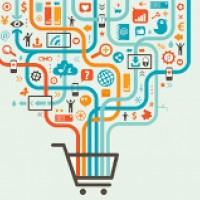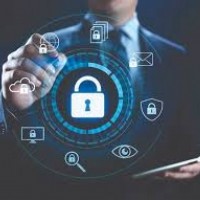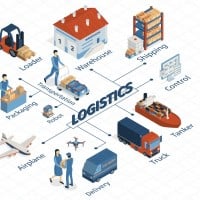Top 10 Industries Most Likely to Be Be Disrupted by A.I.
At this point, it's no secret that Artificial Intelligence, commonly referred to as A.I., is here, and there's a good chance it's here to stay. While it's still very new, the fact of the matter is that it's impressive what you can accomplish with A.I. now, and it's only going to become more advanced over time.It's safe to say that the era of Artificial Intelligence is here and it's not going anywhere in the foreseeable future. Here are some industries that I project will be greatly impacted by A.I. in the near future.

With self-driving vehicles already being developed by companies like Tesla, Google, and Uber, which is exploring self-driving technology, it's only a matter of time before they become available to the public. Obviously, there are ethical considerations involved, and a lot of factors need to be addressed. I don't expect self-operating aircraft any time soon, though I could see self-operating semi-trucks as a real possibility.
It would greatly reduce costs for companies and reduce the amount of time for shipping since the A.I. wouldn't need to worry about rest stops like a human would. I still think humans would be needed to monitor the A.I., but it would alleviate the stress of driving for humans.

Retail analytics is already seeing widespread implementation. Not only can it help optimize the supply chain, but it can also accurately predict how much inventory to stock in the supermarket. It can collect data from consumers to optimize product placement according to what the consumers prefer, which would increase sales.
Amazon has also implemented retail analytics on its own website. By analyzing consumer behavior online, from browsing patterns to online purchases, they can accurately recommend similar products to customers as well. The same thing applies to advertising. This isn't new by any means, but it will likely become more advanced and prevalent in the retail industry.

It's honestly a no-brainer for algorithms to find their way into the banking and finance sector. Banking and accounting firms have increasingly transitioned their operations from paper to online forms already. It's only fitting that these companies incorporate A.I. into their business operations, not only to automate mundane tasks but also to monitor transactions and manage data.
These algorithms can search and detect any suspicious transactions, including fraudulent activity, faster than a human could. Furthermore, it could enable firms to better serve their customers and/or clients by personally adapting to assist with their problems. By identifying customer spending habits, these algorithms could also help customers better budget their money.
Additionally, by analyzing customer spending patterns and credit history, they can identify the likelihood of customers defaulting on a loan.

In an age where cyber threats are at an all-time high, it's more important than ever for companies to be alert and protect themselves against cyber attacks or viruses. Due to the large amount of existing data, AI can be trained to perform surveillance on the company's networks and servers at all times. It can scan through large databases at a much faster rate than humans could.
The algorithm could be programmed to monitor for any suspicious activity. If any suspicious activity or threat is detected, the algorithm can immediately patch the hole in security or notify human handlers of the problem. This means that, for the most part, the AI can handle cybersecurity scanning on its own with very little human assistance.
Granted, some human supervision would probably still be required. AI in cybersecurity could reduce the time required to solve any problems encountered, thus minimizing risk and loss of information. In the event of a cyber attack, every second is vital to minimize the risk of the corporate business losing data, finances, or other vital information and assets.
We've already seen chatbots being implemented in customer service. A lot of websites have chatbot features already implemented for customer support. These chatbots can collect information and, in most cases, resolve issues without human intervention, only alerting humans when needed.
Due to the algorithms' ability to accurately understand what the customer is saying, these sufficiently advanced algorithms may replace customer support executives altogether. These advanced chatbots aren't just a program with predetermined responses. They can dynamically adapt to any issue the customer is facing.
Additionally, the customer doesn't have to be put on hold to wait for a human representative. This reduces wait times and therefore improves customer experience and satisfaction by resolving issues in an efficient and effective manner.

Thanks to A.I., a lot of mundane and repetitive tasks can be taken care of. This would give doctors and specialists more time to talk to and take care of patients. It can also analyze scans, test results, or other patient data, mitigate potential human errors, and generate insights by recognizing patterns.
This means that A.I. can identify and diagnose conditions more accurately than humans can. Additionally, A.I. can be used to monitor patients' conditions in a remote setting and alert healthcare professionals about any issues that need attention.

The military has several possible uses for A.I., including autonomous weapons and combat systems. They can use it in surveillance cameras as well to identify people based on biometric identification databases, which is already being done in China. They have launched a "social credit system" that will give each citizen a score that will increase or decrease based on their actions, similar to a credit score. Of course, it will probably be very regulated because of ethical considerations.

We're already seeing A.I. being used for marketing purposes. The two main benefits here are more personalized advertising and better targeting. A.I. solutions can assist companies by analyzing customer behavior and data and recommend products based on the individual customer's personal preferences.
For example, you buy a pair of shoes from Nike, the A.I. algorithm could then recommend other shoes similar to the pair you bought. It'll also assist companies in reaching their target audiences more easily. Google and Facebook have already started using these algorithms to personalize ads for users. You've probably already noticed this by using social media platforms. You might see advertising tailored to promote products you're interested in.

Obviously, there is going to be some sort of legislation on what A.I. can or cannot do in the world of Law. One way it's already being implemented is to review contracts faster, more reliably, and more consistently. The A.I. could pick up errors in the contracts that a human lawyer might miss. In fact, we're already seeing this happening.
Lawgeex is a startup A.I. that has been programmed to review contracts quicker and, in some cases, more accurately than human lawyers. It's also being used in the discovery process, which is essentially the legal process for identifying relevant documents from an opponent in a lawsuit. Granted, I don't think you'll be seeing full-on A.I. lawyers anytime soon. However, the more advanced A.I. becomes, the more feasible the idea becomes. Especially for those who can't afford a lawyer.


A.I. can drastically improve efficiency and effectiveness in the logistics department. Thanks to predictive analytics, A.I. can accurately predict how much inventory a specific vendor needs. It could also optimize routes to save on overhead costs.
Likewise, shipping companies could greatly benefit from A.I. technology. Document checks at customs checkpoints are a long process, and it can take days to clear a ship to ship all its cargo. Imagine how much time could be saved if A.I. were implemented. It would greatly reduce time spent in ports and decrease the time for orders to be shipped.